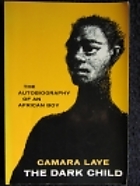 This is a fairly short and simple autobiographical account of a boy growing up in Guinea in the 1930s and 40s. Camara Laye wrote it in 1954 while studying in France, and you can feel the nostalgia for his homeland. Although the writing style is quite understated, the emotion is communicated quite effectively, and it’s very moving in places.
This is a fairly short and simple autobiographical account of a boy growing up in Guinea in the 1930s and 40s. Camara Laye wrote it in 1954 while studying in France, and you can feel the nostalgia for his homeland. Although the writing style is quite understated, the emotion is communicated quite effectively, and it’s very moving in places.
As the title suggests, the book only deals with his childhood, and it is faithful to a child’s outlook on the world. At the start, his entire world is the veranda around his father’s hut. Then it gradually expands to the rest of the concession, then to school, the town of Kourassa, then the wider country of Guinea when he goes off to study in the capital Conakry. Finally the link with childhood is severed altogether as he gets on a plane to France.
The mixture of pain and excitement at each stage of growing up is beautifully rendered. He wants to be part of his family, to follow his father as a blacksmith or his uncle as a farmer, but always knows that his success in school is moving him further away from that. He is being marked out for a different future, his family are sacrificing to give him something better, and he wants that, but also wants to stay where he is. His parents, too, are caught in this conflict of wanting him to succeed but knowing that his success means his departure from their lives.
Quite a bit of time is spent describing the circumcision rite, which may be of anthropological interest to some, but was for me more interesting as a symbol of the other changes he goes through in the book, the pain and fear at something new, the loss of the old, but also the anticipation of being a man, the pride he feels when he is given his own hut and his own grown-up clothes.
My copy is from 1969, and made me realise a couple of things. First, the introduction emphasises again and again the “dignity” of the protagonist and his family, as if it’s some amazing discovery that Africans can have dignity. Some people of course would still hold similar views, but I’m glad that for most of us today the value of a book like this is no longer in the radical discovery that African people are actually human beings. The second thing I realised is that I need to start buying hardbacks – this paperback literally crumbled in my hands as I read it. Does anyone else have very old paperbacks (60s or earlier)? Do they last?
Anyway, I enjoyed this book as an insight into a life at a moment of great change, starting in a very traditional setting and moving very quickly into different worlds. A lot of the political context is absent – French colonialism, for example, is only a shadowy presence in the book – but I don’t see this as a fault. This is a childhood memoir, and does no more or less than you’d expect: it gives a faithful depiction of the author’s early years. I found it interesting and quite moving.



There are 6 comments
I think this is a good overall analysis of this book. It is clear that this autobiography of a ‘Dark Child’ (more specifically an African child in a French colony) needs to be understood in terms of its socio-political background, and it is interesting to note that Laye does not give us much of depth in this area compared to writers such as Fanon. This is in fact questionable and although perhaps driven by nostalgia as it seems throughout his writing, it leaves me wondering how much censorship from a French publisher this book received.
Hi Hannah
That’s an excellent point about censorship. It would certainly have been a big issue in France in 1954. And censorship, of course, often leads to self-censorship too, as writers withhold things they know will be unpublishable. Thanks very much for visiting, and for adding an extra layer to my understanding of the book and its context.
hi, i am interested in making a comparison between the translation of this novel into english and arabic. unfortunately in morocco i can only afford the original in french and its arabic translation. could anyone help me in getting the english version.this is my e-mail fox_of_desert@hotmail.fr
thanks in advance
That sounds like an excellent project. I would have happily sent you my copy, but I donated it before I left England. I hope someone else who reads this will be able to send it to you. Best of luck!
hello! i would like that someone make me the comparison between so long a letter of mariama ba and the dark child of camara laye
very interesting summary